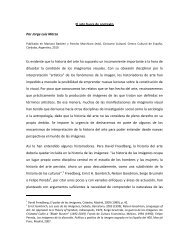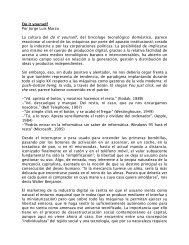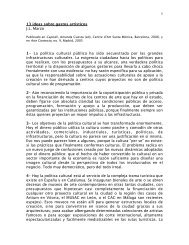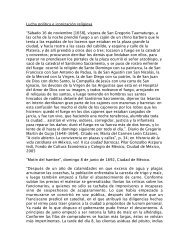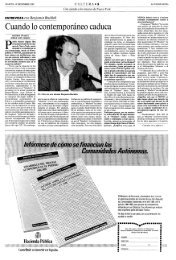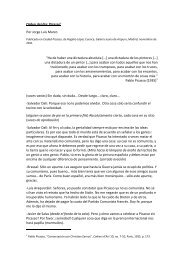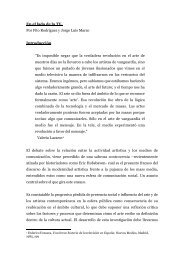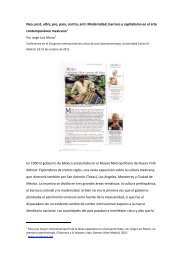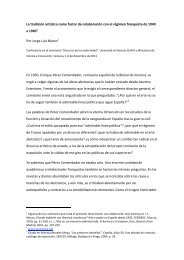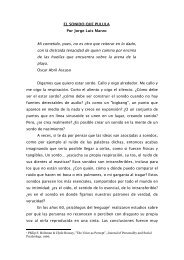Campaign Diary Roberto AlfaCampaign Diary Roberto Alfa52 535 days to goSlogan and adhesive ability3 days to goSlogan and adhesive ability (part 2)We picked the main slogan of the campaignmonths ago: “Of course you can”. And thesecondary one: “Think about it and vote”.Nothing new, but then campaigns never are.That’s the thing about the <strong>de</strong>mocracy show;wherever you buy your ticket, you’ll always getto see the same performance. In the beginningwe argued a lot about the expression “ofcourse…”. Normally you’d just say, “Yes, youcan” or “You can”. Adding “of course” as ameans of affirmation, of confirmation, runsthe risk of seeming didactic or paternal. Andthough we do want to be didactic or paternal,we don’t want people to notice. At the sametime “of course...” gives a touch of ease, ofconvenience, of feasibility which stresses normalityin the i<strong>de</strong>a of change. It’s as if someonehad cleared up all your doubts. A woman onthe team pointed out one day half jokinglythat it seemed like a slogan for Viagra. Andthat’s true. Precisely because of that suggestivecomparison, we <strong>de</strong>ci<strong>de</strong>d to use lots of middleagedpeople in the ads who could in some waysubliminally take in the message. At the sametime, “Of course you can” goes down well withyoung people and women who are always in<strong>de</strong>cisive.We don’t care about old people: theyonly vote based on old emotions and becausethe very stupid ones think that voting is liketaking out life insurance.Miguel has also chosen the predictable, moreof the same: “The value of things well done”.Nevertheless, I’m surprised by such a longsentence that is so open to interpretation inevery word. Naturally they’re going to <strong>de</strong>fendthe previous legis<strong>la</strong>ture, but there’s somethingstrange in the re<strong>la</strong>tionship between the words.It’s as if they’d said: “Well, we’ve done a goodjob, and so let’s move right along”. I think Ialready mentioned that Miguel is an intellectual,so these types of slogans shouldn’t reallysurprise me. Going for that type of thing suggestsa campaign based around data, figuresand statistics, in other words a camouf<strong>la</strong>gewar. That’s no problem. I’m ready for it. Ifthey want a war, they can have one.The mission of any electoral message or slogan is tobring a personal (colloquial and close) form of the i<strong>de</strong>ologyand programme into the media. It has to be a shortand expressive, incisive and mechanical phrase whichbrings to mind the “core i<strong>de</strong>a” of the campaign. It is, inshort, a set of motor words which can’t allow for toomany p<strong>la</strong>ys on meaning, only the required ones; and forthat reason it is an important choice. The slogan is irremissiblyassociated with repetition; it uses it to take holdin the mind and to inject (above all) a series of images.A slogan fi nds its p<strong>la</strong>ce for interpretation in an electionad, a projection which it does not have in other propagandamedia save for the radio. In the ad the sloganmay be an argument, conclusion or coda, but what iscertain is that it reveals its real enunciative meaningand can reach that much sought-after emotional dimension.If the slogan can be pumped up in the broadcast ad,then the campaign will be a roaring adhesive success.The bosses don’t dare to use the expression“firm hand”. Yet I know we’d be right onthe button. The ad has turned out to be too“simi<strong>la</strong>r”. The office tells me it should be likethat, that it’s good if we are simi<strong>la</strong>r to reachout to the un<strong>de</strong>ci<strong>de</strong>d voters. That means theyhave no i<strong>de</strong>a about “un<strong>de</strong>ci<strong>de</strong>d voters”. It’s aquestion of being a ventriloquist, of speakingwithout appearing to do so, in or<strong>de</strong>r that fora few weeks you don’t look like yourself, youcan reinvent yourself and <strong>de</strong>monstrate yourcharisma (I guess that’s true both for the bossand for me). The important thing is renewingthe brand, like when my son gives me atraditional milkshake but in a new ergonomicbottle (maybe the kid is more like me). Politicsis pure business ergonomics, a mere exercisein adherence. Here the un<strong>de</strong>ci<strong>de</strong>d don’t countfor much, they’re like the customers who “still”haven’t bought your product: the questionis keeping those you’ve already got loyal andselling the same as the others, but cheaper andmore fashionable.A good campaign has to have an unmistakably adhesivefeature. Getting things to stick in people’s ears an<strong>de</strong>yes and in the senses as a whole is fundamental forgetting them to stick in the voter’s heart. Fixing them inthe mind will come about as a result of all of this, butonly <strong>la</strong>ter on; a campaign is a perishable product whichmust be consumed quickly.Some time ago there was a story in the papers abouta group of US researchers who had discovered the partof the brain which makes us get hooked on songs. Theyget stuck in your mind, you carry them around with youand you get caught humming them in the most unexpectedp<strong>la</strong>ces. It doesn’t matter whether you hate theseditties as they stay hid<strong>de</strong>n before springing out on you,and when you hear them again you hum along almostwithout wanting to. This is a good time to recall Alfa’spoetic remarks (see below) about the repetitive gameshe would p<strong>la</strong>y with words as a child.But in our medicalised society someone has alreadythought about whether it would be possible to find acure for this torment. There are research projects whichare trying to solve the mystery of the catchy summertune, of the smash hit anchored in this inhospitablepart of our brain. Finding those features and being ableto control them would be a gold mine for audiovisualproduction.A group of scientists from Dartmouth in the UnitedStates have found the part of the brain where a songis recor<strong>de</strong>d in our memories; it is in the auditory cortexwhich coordinates all the information from our ears.The American researchers experimented with volunteersand ma<strong>de</strong> them listen to well-known songs. Theyrealised that when the tune stopped, the auditory cortexremained active which meant that the catchy songcontinued p<strong>la</strong>ying in the brains of the volunteers.
Campaign Diary Roberto AlfaCampaign Diary Roberto Alfa54 55Up until now theories had focussed on the i<strong>de</strong>as of Professor James Kel<strong>la</strong>ris, who argued that a hit produces an itchin the brain which can only be relieved by mentally repeating that song. Humming it would thus be like scratching.With no time to lose, the record industry has got down to work because this means that hit songs can be produced bycomputers. A program called Hit Song Science is already being <strong>de</strong>veloped which compares a song with the 3.5 millionbest-selling songs over the <strong>la</strong>st <strong>de</strong>ca<strong>de</strong> to draw up a report. Stemming from this sophisticated initiative it is interestinghave material that’s striking because it’s supposedlyprivate. Of course it’ll show the boss takingf<strong>la</strong>wless <strong>de</strong>cisions in private and surroun<strong>de</strong>d byhis closest ai<strong>de</strong>s and advisers. We’ll see if theybring it out. It’s a hot potato.to specu<strong>la</strong>te what the “standard” jingle might be for a campaign and what factors need to be taken into account. Andof course it would be even more interesting to be able to enter all of the catchy songs, rhymes and jingles of the world’sbest electoral campaigns into this program to get the ultimate electoral melody, the one which takes the voter straightto the polling booth in any p<strong>la</strong>ce and in any situation. They would be pulled along by their ears, of course.Before I went home the boss came up to me, andI reckon he was a bit sloshed. He gently took myarm, brought his face close to mine and said,while he smiled that smile of his: “So?” “You’llwin a couple of million votes. That’s all I2 days to goDry or non-productive cough/political coughknow,” I said. He kissed my face.I read yesterday’s entry and I say it again: beingun<strong>de</strong>ci<strong>de</strong>d is just so much smoke, but I earn alot of money by getting loads of people to breatheit in. Making them cough is my job.Day 0I get back from sticking up the first posters andit’s very <strong>la</strong>te. It’s all gone as usual. When Igot to HQ they had <strong>la</strong>id on a few drinks tocelebrate the fact that tomorrow it’s on. Theycalled it a “party”. One of the bosses came downto encourage us. They can’t help it, they’re allfloating. They say that war brings out thebest in men. They feel important; hor<strong>de</strong>s ofjournalists are constantly knocking at the door,image, image and more image. They have to goto interviews, <strong>de</strong>bates, talks, meetings, dinnersand parties, all of them packed with cameras.Someone recently told me that some candidateshave invited journalists to join their entourageand film them behind the scenes, so that they“Clinically-speaking a cough is <strong>de</strong>fi ned as a brusqueand explosive respiratory movement <strong>de</strong>signed to eliminatematerial from the respiratory system,” RobertoAlfa used to say jokingly. “It is a <strong>de</strong>fensive mechanism.A dry cough, by contrast, does not lead to expectorationand is not productive.”If a cough were political it would seek to eliminate the “information overload” in people’s information diets. A politicalcough is either productive or it isn’t. Potential voters, anaesthetised by the huge quantity of information whichthey receive with only brief time intervals in between, cannot digest all of this diverse and enormous material un<strong>de</strong>ri<strong>de</strong>al conditions which call for comparison, criticism and the time necessary to evaluate it. Information today doesnot mean action and there is information which we can’t do anything about. The Spanish writer Juan José Millásrefers to it as “a datum without information”: “It is, in effect, a datum with the taste, smell and texture of a realdatum, albeit manipu<strong>la</strong>ted in such a way that is has no references. Hence it is a useless datum: it doesn’t make youfat but it doesn’t feed you either. If it did feed you, then you and I would be wiser than Solomon, as we do nothingelse except ingest data on a <strong>la</strong>rge scale.”A datum without information, like a non-productive cough, fi nally leads to disgruntlement when faced with theimpossibility of cleaning out our information menu and, from the voter’s perspective, it should be said that electionads will give you a cough… for spitting.Images which cover up imagesAudiovisual electoral campaigns, like street graphics,are both a celebration of advertising images and asubtle work of concealment. Any election cancels outother possibilities. The <strong>de</strong>cision about the audiovisualfocus of the ad <strong>de</strong>fi nes the way in which these otherimages will be “covered up”; those from the wi<strong>de</strong> rangeof problems which are (ought to be, in reality) the stuffof politics. Some are chosen to cover up others. And ina loop which is not exempt from perversion, this coveringup is announced as a reve<strong>la</strong>tion which is none otherthan that of the image (simply the image) of the lea<strong>de</strong>ras a political issue.Day 1This morning I had a nosebleed in front of myson. I don’t want to fool anyone. It was luckyit didn’t happen in front of the boss. I knowwe are going to win; we have to win. Withoutanyone asking for his opinion, which is whybosses are bosses, one of them told me: “Don’tworry, you’re riding the winning horse.” I feltlike reminding him that one thing is the ri<strong>de</strong>rand the other the horse, and that I provi<strong>de</strong> thehorse. The harness is temporary, but as theTurkish presi<strong>de</strong>nt once said, “Democracy isjust a tram which takes you to your <strong>de</strong>stination.”My <strong>de</strong>stination is winning, to makesure the horse always adjusts without a glitchto any ri<strong>de</strong>r. Doesn’t matter which countryor which candidate. For me a campaign is atrain which takes me to another campaign. Notforgetting that is the quintessence of this job.Let’s see how everything goes. I know Miguel,my opponent, is a tough nut to crack. We’vebeen up against each other before. His boss iswhat worries my boss. Because even thoughthere are other candidates, who the hell caresabout them? Miguel pretends to be an intellectualbut he’s just an old dog like me. Once,years ago, he told me that the main techniquefor sabotaging an enemy’s campaign is tobribe the boss of the printing works which producesthe posters. If you know the campaignslogan in advance, you can put on the hurt.I remember how I <strong>la</strong>ughed when I tried this outin a previous campaign: I told the guy who wasprinting our material to let himself be bribed bythe opposing candidate and give out fake information.We lost the elections but I still rememberhow they took a week to get over the shock.<strong>El</strong>ectoral campaigns“The day on which everything starts and everything fi n-ishes. The start of the electoral campaign is greeted inpolitical marketing as the great day. The electoral campaignfor the electorate is the start of a spectacle thatis increasingly insulted, in which everything soundsexcessive, in which the news is observed from a differentpoint of view and suspicion takes control of eventsand outcomes.” These words of the German politicianGregor Gysi serve to introduce the following questions:Should an election campaign be seen as pollution ofwhat is social? What is the real need for a campaign?Could there be other ways of carrying out an electioncampaign? What are the real effects on politics ofthe progressive audiovisualisation of campaigns? Thisis what Alfa once said: “There is as much ignoranceamong the electorate about what an election campaignis as there is ignorance about day-to-day politics.Meetings between the real world and the world ofelectoral fantasy always take p<strong>la</strong>ce in the arid terrainof disagreement and susceptibility.”




